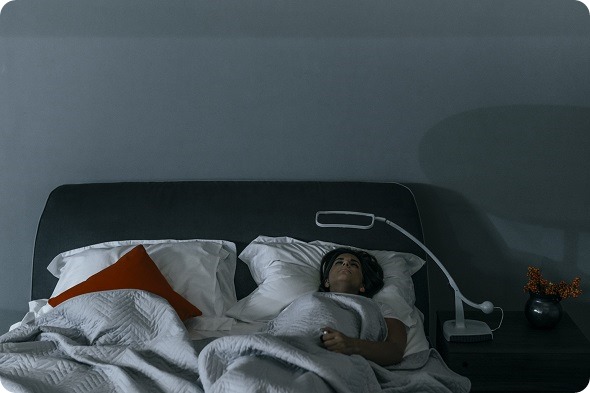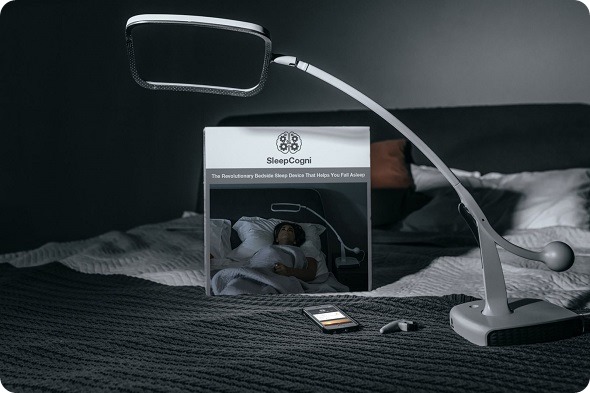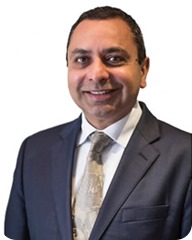Insomnia refers to a clinical condition that is characterized by one or more of the following – difficulty initiating sleep and/or maintaining sleep and/or waking up too early AND associated with symptoms the next day such as sleepiness, lethargy, loss of concentration.
Insomnia that is uncomplicated by another medical or psychiatric condition (Primary Insomnia) is usually treated with Cognitive Behavioral Therapy (CBT) - more accurately called CBT-Insomnia (CBT-I) – CBT-I uses the following techniques and strategies to treat insomnia:
- Sleep Hygiene
- Stimulus control
- Relaxation training
- Sleep restriction
Sleepcogni
Please can you give a brief introduction to SleepCogni – what exactly is it and how does the device work?
The SleepCogni is a device that measures physiology and provides a feedback loop to assist people who have Sleep Initiating Difficulties (Insomnia).
It utilizes two essential elements of CBT – Stimulus Control and Relaxation Training by using a feedback loop using audio, visual and tactile stimuli in reaction to physiological responses - in other words it helps you to gradually relax and induce sleep by providing you the feedback-stimulus loop that assists with sleep onset.
Can you explain how SleepCogni integrates CBT with physiological measures?
Hyperarousal (or increased activation of the Sympathetic (Adrenalin) Nervous System is one element involved in preventing sleep onset – the SleepCogni provides audio, visual and tactile cues that is dependent on heart rate (a direct indicator of Sympathetic stimulation) and then adjusts the rate and tone of the non-stimulating/non-melatonin suppressing light flashing to help you to relax (i.e. reduce sympathetic stimulation) – so it is a mix of stimulus control, relaxation and in a way self-hypnosis
Why haven’t previous treatments used physiological measures in combination with cognitive behavior therapy (CBT)?
Partly because of the lack of available technology and partly because of an institutional bias – i.e. “if CBT has been proven to be effective why should one try other methods?!”
How many scientific studies have been carried out on SleepCogni? What have been the results so far?
So far there has been one small study at Sheffield Hallam University that demonstrated 50% of those trialed recorded an improvement in quality of sleep and 40% of those reported an increase in sleep duration (as compared to using the Gold Standard method – a leading meditation CD).

Were you surprised by any of the findings of the clinical studies at Sheffield Hallam University?
I was quite positively surprised to see how effectively the SleepCogni performed – but again one needs more data to further develop the model (hence call out to Kickstarter community which will be launching on 2 November).
How does SleepCogni compare to other sleep devices on the market?
It is unique because it uses a combination of physiological feedback combined with behavioral modification rather than relying purely on behavioral modification/simply monitoring conditions and providing post-event feedback.

What do you think the future holds for treating insomnia?
With devices like SleepCogni I see a trend to provide the patient with the tools to treat their own insomnia rather than relying on seeing professionals and leaving only the more serious insomnia to be treated one-to-one
Where can readers find more information?
About Dr Ebrahim
Dr. Irshaad Ebrahim obtained his medical degree from the Nelson R Mandela School Medicine, South Africa. He subsequently worked in Canada as a research associate and then trained in Psychiatry at University College London and Guy's King's and St. Thomas' Hospitals, London.
He has postgraduate qualifications in Family Therapy, Neuropharmacology and the Neuropsychiatry of Sleep and Memory disorders.
He was the first NHS appointed Consultant Neuropsychiatrist in Sleep Disorders in the UK. This post is based at the Sleep Disorders Centre St. Thomas' Hospital, London.
In 2001, he set up The London Sleep Centre, a multi-disciplinary center providing a comprehensive service for patients with all types of sleep disorders.
In 2005, he opened the Edinburgh Sleep Centre, the second multidisciplinary sleep center in the UK.
He has published in a variety of peer-reviewed publications and books. He is a member of the British Medical Association, The British Sleep Society (BSS), and The American Academy of Sleep Medicine (AASM), The British Neuropsychiatry Association (BNPA), the Royal College of Psychiatrists and a committee member of the Royal Society of Medicine section on Sleep Medicine.
He is the co-founder and current Vice-President of The South African Society of Sleep Medicine.